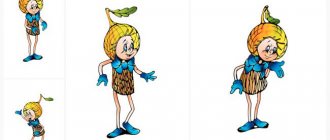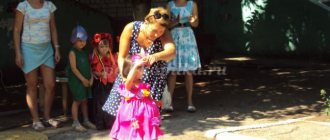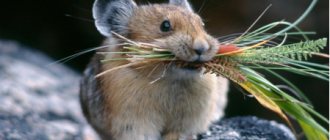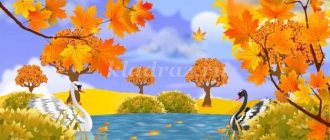Ecological entertainment in the preparatory group
Educational entertainment in the preparatory group on the topic “We know and love nature”
Author: Elena Ivanovna Ponkratenko, teacher of MBDOU kindergarten No. 114 “Cheburashka”, Bryansk, Bryansk region. Description of work: This material is aimed at organizing educational leisure with children of senior preschool age as part of environmental education. The development will be useful for educators, preschool education teachers, and primary school teachers. Entertainment can be done as a brain ring game. Goal: formation of ecological culture among preschool children. Objectives: to summarize and test children’s knowledge about the flora and fauna of nature, the rules of behavior in nature, phenomena occurring in the life of plants and animals in the spring, to continue to develop the ability to independently, logically briefly, accurately express their thoughts, to educate, respect for nature, desire take part in its protection and protection. Rules of the game: Divide the group into 2 teams, they are asked to answer the same questions. Take 1 minute to think about each question. For the correct answer - 1 point. For a task completed by the whole team - 3 points. Equipment: 2 telephones, envelopes with illustrations of migratory and wintering birds, envelopes with illustrations of indoor and medicinal plants, a black box, aloe, medals for awards.
Progress of the entertainment:
Presenter: The game “Brain Ring” is a game of cheerful, resourceful, smart children. Now we will play it. Rules of the game: we have 2 teams - the Rodnichok team is at the blue table, and the Sunshine team is at the yellow table. There are 2 phones on the tables. When the answer is ready, press the phone button (1 minute to think about the question; if the answer is incorrect, then the opposing team gives the answer). Questions of the 1st round.
1. Why do plants need to be watered less often in winter?
(They are resting.)
2. Why is it necessary to inspect the plants daily?
(So as not to miss the appearance of pests and diseases)
3. What should be done with a broken branch?
(Cut with pruning shears, inform the teacher, place in a group)
4. What to do if the chick falls out of the nest?
(Call an adult, watch so that no one can disturb him)
5. What should be done with the bird feeding area in winter?
(Clear away snow, food, sprinkle a little so that it does not freeze to the ground.)
6. Why is it better to water plants from a watering can rather than from a bucket?
(When watering from a bucket, you can damage their roots and break it with a stream of water.)
7. Why can’t you pick buds from trees?
(The leaves sleep there; there will be no leaves on the branch.)
8. Why you need to think carefully before getting an animal or birds.
(An animal or bird in a corner of nature is helpless. They cannot get food or build a nest; a person should know well what is good and what is bad for an animal or bird.)
9. When and how is Bird Day celebrated?
(On March 25, they install poles with birdhouses and drink tea with lark buns.)
10. Why do you need to loosen the ground?
(So that air passes to the roots.)
11. What is the “Red Book”?
(Warning that the species of plants and animals described in it require constant protection.)
12. What rules of behavior in nature do you know?
Do not speak loudly if there is a bird nest nearby; Do not pick flowers; Walk along the paths; Extinguish fires to prevent fires; You cannot throw garbage; You can’t pick too many flowers; Plants must not be trampled; Do not take animals and birds from their usual conditions. Educator: Well done, guys! You coped well with the tasks of the first round. We are starting round II. I have envelopes with assignments in my hands. Team captains select two envelopes for their teams. Teams are given 2 minutes to think about their answers. 1 envelope - Name the migratory birds based on the pictures provided. Children: Migratory birds - swallow, finch, starling, lark, oriole, swan. Envelope 2 - Using the proposed pictures, name the wintering birds. Children: Wintering birds - woodpecker, nuthatch, crossbill, tit, sparrow, goldfinch. Envelope 3 - Name indoor plants based on the pictures provided Children: Indoor plants - geranium, cactus, ivy, fern, tradescantia. 4 envelope - Name medicinal plants based on the pictures provided Children: Medicinal plants - chamomile, marigold, plantain, thyme, mint, lily of the valley. Educator: Well done, guys! Let's take a little rest. Physical education minute We will rest a little, We will stand up, take a deep breath, The children walked through the forest, We watched nature. They looked up at the sun and their rays warmed them. Miracles in our world: Children became dwarfs. And then everyone stood up together, We became giants. Butterflies were flying, flapping their wings. Let's clap and stomp our feet! We had a good walk, and a little tired! Educator: The jury put points for the answers in the tournament table. Let's listen to the interim results of the competition. The chairman of the jury speaks. Educator: The next competition is “Black Box” . I have in my hands a black box in which a houseplant is hidden. Now I will describe it to you verbally. Task for the teams: guess which indoor plant is hidden in the box. Educator: The stem of this indoor plant is straight, the leaves are succulent, thick and oblong with jagged edges, the leaf surface is smooth. Care - rare watering, wipe off dust from leaves, loosen the soil.
Answer: Aloe Teacher: IV round of our game - “Guess the taste”
Assignment to the teams: With eyes closed, taste and name a fruit or vegetable after tasting a piece. Pieces of apple, pear, banana, boiled potato, onion, carrot, cucumber, and orange are prepared on a plate. A member of each team takes a piece with his eyes closed, eats it and gives an answer. Educator: The next round of the game is called “Folk Signs”
Educator: I will read to each team in turn signs, proverbs, sayings about spring, and you must continue them. Each correct answer is worth 1 point. Signs: A long icicle - to... (long spring). May is cold - bread... (bread). April with water - May... (with grass). Spring is red with flowers, and autumn... (with pies). Educator: It's time for the final round. Now the teams will listen to the stories and say what they would do in the proposed situations. 1. A healthy chick is sitting. Quietly waiting to be fed. The boy wanted to bring the chick home. And although the chick was surrounded with care at home, the chick became ruffled, refused to eat, and instead of the expected joy, pain and anxiety appeared from the inability to help the chick. What would you do? Children: You cannot take a chick from its usual conditions. 2. The puppy was lonely. He was sitting on a mat without straw. I couldn’t play with the kids or be affectionate with people I didn’t know. He just kept looking around, just calling out to people as best he could. People walked away. “Well, he barks at everyone, what a dog.” “There’s just some kind of animal in the yard.” “She’ll bite... That’s how evil she is,” people said in the yard, not knowing the dog’s language. Children: You need to look for the owner of the puppy or give it to the person who will need the puppy and be happy. Educator: Well done, guys! You showed a great game today. I hope that you will always use your knowledge in everyday life, love and protect nature. Now let's give the jury the floor. Summarizing. Team awards.
We recommend watching:
Ecological conversation for children of the preparatory group Synopsis of a lesson on ecology for children of the preparatory group Synopsis of a lesson on ecology for children of the preparatory group of a preschool educational institution Work program for additional education in a preschool educational institution on ecology
Similar articles:
Lesson summary - fairy tales in the preparatory group of kindergarten
Summary of a lesson on ecology in the preparatory group. Plants on the territory of the kindergarten
Summary of a lesson on ecology in the preparatory group. Garden plants
Summary of a lesson on ecology in the preparatory group. Vegetable garden plants
Conversation “Take care of the forest” for preschool children of the senior preparatory group




